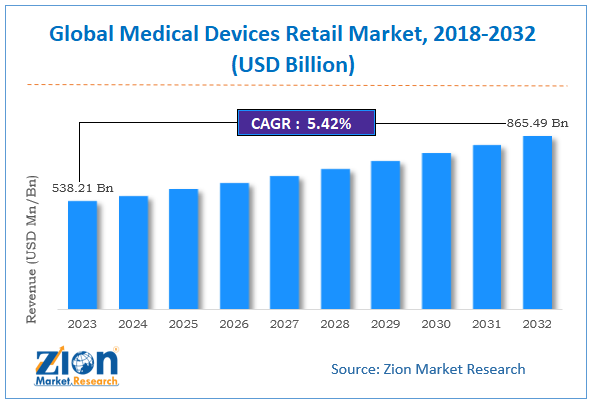Medical Devices Retail Market Size, Share, Industry Analysis Report 2032
The medical devices retail market refers to the segment of the healthcare industry focused on the distribution and sale of medical devices directly to consumers or through retail channels. This market includes a wide range of devices, from basic health monitoring tools to advanced diagnostic and therapeutic equipment. The growth of this market is influenced by factors such as increased consumer awareness, the rise of e-commerce, and the growing prevalence of chronic conditions requiring home monitoring.

Get a Free Sample : https://www.zionmarketresearch.com/sample/medical-devices-retail-market
Key Market Insights
Market Growth Drivers:
- Rising Consumer Health Awareness: Increasing awareness about health and wellness is driving consumers to seek out medical devices for home use, such as blood glucose monitors, blood pressure monitors, and fitness trackers.
- Advancements in Technology: Innovations in medical devices, including smart and connected devices, are enhancing consumer interest and adoption. These devices often offer features like real-time data monitoring and integration with mobile apps.
- Chronic Disease Management: The growing prevalence of chronic conditions like diabetes, hypertension, and respiratory disorders is leading to higher demand for home-use medical devices that facilitate ongoing monitoring and management.
- E-commerce Growth: The expansion of online retail platforms is making medical devices more accessible to consumers, allowing for easier comparison, purchasing, and home delivery of products.
- Aging Population: An aging population that requires more frequent health monitoring and management is boosting demand for various medical devices.
Market Segmentation:
- By Device Type:
- Home Diagnostic Devices: Includes devices for measuring blood glucose, blood pressure, cholesterol, and other health indicators.
- Fitness and Wellness Devices: Includes wearable devices like fitness trackers, smartwatches, and activity monitors.
- Respiratory Devices: Includes home-use devices such as nebulizers, CPAP machines, and oxygen concentrators.
- Orthopedic Devices: Includes supports and braces for managing musculoskeletal issues.
- Personal Care Devices: Includes devices like thermometers, hearing aids, and eye care products.
- Others: Includes devices for home dialysis, wound care, and home IV therapy.
- By Distribution Channel:
- Online Retail: Includes e-commerce platforms, company websites, and online marketplaces.
- Pharmacies and Drugstores: Traditional retail locations where consumers can purchase over-the-counter medical devices.
- Specialty Stores: Stores that focus on medical and health-related products.
- Direct Sales: Includes sales through medical device manufacturers' direct channels or home healthcare providers.
- Others: Includes supermarkets, convenience stores, and other non-traditional retail channels.
- By End-User:
- Home Care: Devices used by consumers for personal health monitoring and management at home.
- Healthcare Professionals: Devices purchased by healthcare providers for use in clinical or outpatient settings.
- Fitness Enthusiasts: Individuals seeking devices to monitor and enhance their fitness and wellness.
- By Device Type:
Geographical Insights:
- North America: The largest market due to high consumer spending on health and wellness, advanced healthcare infrastructure, and widespread availability of medical devices through various retail channels.
- Europe: A significant market driven by high healthcare standards, increasing consumer interest in health monitoring, and strong retail distribution networks.
- Asia-Pacific: Expected to experience substantial growth due to rising healthcare awareness, increasing disposable incomes, and expanding e-commerce and retail sectors.
- Latin America and Middle East & Africa: Emerging markets with growing healthcare needs, improving retail infrastructure, and increasing access to medical devices.
Challenges:
- Regulatory and Compliance Issues: Medical devices are subject to strict regulations and standards, which can complicate the retail process and affect product availability.
- Product Reliability and Quality: Ensuring the reliability and quality of medical devices sold through retail channels is crucial for consumer safety and trust.
- Cost Considerations: The cost of medical devices can be a barrier for some consumers, particularly in regions with limited access to affordable healthcare products.
- Counterfeit Products: The presence of counterfeit or substandard medical devices in the market can pose significant risks to consumer health and safety.
Competitive Landscape:
- Key Players: Major companies in the medical devices retail market include Philips Healthcare, Omron Healthcare, Abbott Laboratories, Fitbit Inc., and Medtronic. These companies focus on product innovation, expanding their retail presence, and enhancing consumer engagement.
- Product Innovation: Companies are developing new and improved medical devices with advanced features, such as connectivity, user-friendly interfaces, and integrated health monitoring capabilities.
Future Trends
- Integration with Digital Health: The convergence of medical devices with digital health technologies, such as mobile apps and telemedicine platforms, is expected to enhance consumer engagement and improve health management.
- Growth of Smart Devices: The market will see continued growth in smart and connected medical devices that offer real-time data tracking, remote monitoring, and integration with digital health platforms.
- Expansion of E-commerce: Online retail will play an increasingly significant role in the distribution of medical devices, driven by convenience, wider product selection, and competitive pricing.
- Increased Focus on Preventive Care: The growing emphasis on preventive care and health monitoring will drive demand for devices that enable early detection and management of health conditions.
- Personalized Health Solutions: Advances in technology will lead to the development of more personalized medical devices tailored to individual health needs and preferences.
The medical devices retail market is poised for continued expansion as technological advancements, increasing consumer health awareness, and the growth of e-commerce drive demand for innovative and accessible health monitoring solutions. The future will likely see greater integration of digital health technologies, a focus on smart devices, and increased availability through diverse retail channels.
Contact :
US OFFICE NO +1 (302) 444-0166
US/CAN TOLL FREE +1 (855) 465-4651
Email: sales@zionmarketresearch.com

Comments
Post a Comment